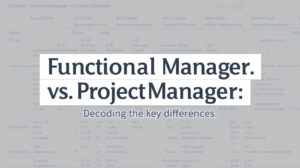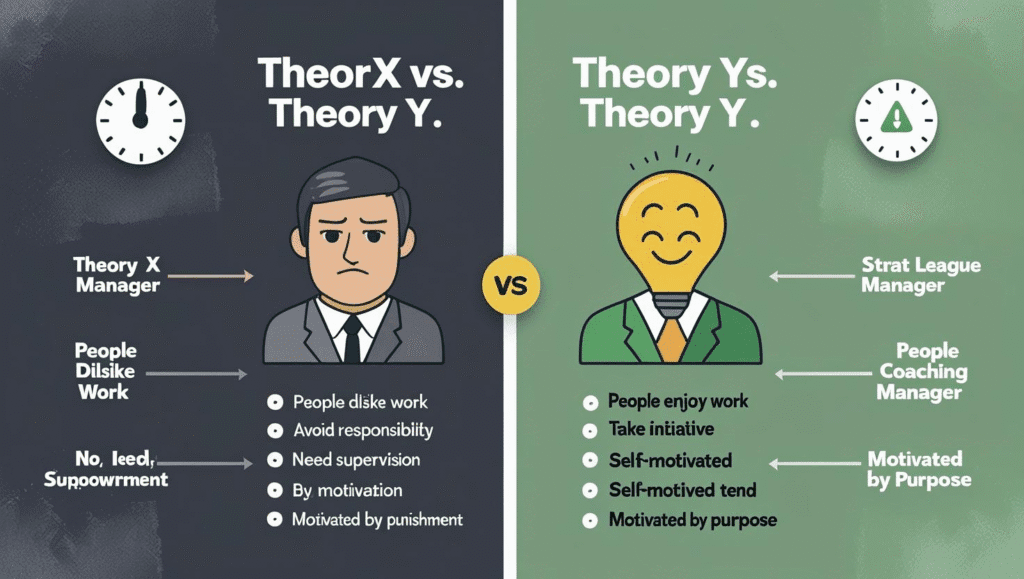Functional Manager vs. Project Manager: Decoding the Key Differences
In the complex machinery of a modern business, “manager” is a title that covers a vast and varied territory. Two of the most critical—and often confused—roles are the **Functional Manager** and the **Project Manager**. While both are essential for an organization’s success, they operate in different spheres, with distinct goals, responsibilities, and measures of success. Understanding the fundamental differences between these two roles is crucial for career development, effective collaboration, and building a successful organizational structure. 🏗️ vs. 🏭
Think of it like building and running a power plant. The **Project Manager** is the expert who leads the temporary team to build the plant. Their world is defined by a specific goal (a finished power plant), a budget, and a deadline. Once the plant is built, their job is done. The **Functional Manager**, on the other hand, is the plant director who takes over once it’s operational. Their world is about the ongoing, day-to-day running of the plant—managing the staff, ensuring efficiency, and maintaining the equipment for years to come.
This comprehensive guide will provide a deep dive into the major differences between functional and project managers. We’ll explore their unique responsibilities, authority, skill sets, and how they interact in a typical U.S. corporate environment. Clarifying these roles is the first step toward building a more efficient and collaborative workplace.
Key Takeaways: The Management Divide –
- Functional Managers lead permanent, specialized departments (e.g., Marketing, HR, Finance) and are focused on **operational stability and efficiency**.
- Project Managers** lead temporary, cross-functional teams and are focused on delivering a **unique outcome on time and on budget**.
- A Functional Manager’s authority is **formal and hierarchical**, based on their position in the org chart.
- A Project Manager’s authority is often based on **influence and expertise**, as they “borrow” resources from functional departments.
- The roles are not in conflict; they are complementary and must collaborate for organizational success.
The Functional Manager: The Pillar of Stability
The Functional Manager is the traditional “department head.” They are a specialist in a specific business function and are responsible for a permanent team of people who perform that function. The Director of Marketing, the Head of Engineering, and the Accounting Manager are all examples of functional managers.
Core Responsibilities and Focus
The world of the functional manager is cyclical and continuous. Their primary goal is to maintain and optimize the ongoing operations of their department.
- Managing People: They are responsible for the hiring, training, career development, and performance reviews of the employees in their department. They are the direct, long-term boss.
- Maintaining Technical Excellence: They ensure their department stays up-to-date with the best practices, tools, and technologies in their specific field (e.g., the latest accounting standards or digital marketing trends).
- Ensuring Operational Efficiency: Their focus is on making their department’s processes as smooth, efficient, and cost-effective as possible. They are constantly asking, “How can we do our ongoing work better?”
- Resource Allocation: They manage the department’s budget and allocate their team members’ time to various tasks and, importantly, to projects led by project managers.
The Functional Manager’s mantra is: “How do we sustain and improve our daily operations?”
The Project Manager: The Agent of Change
The Project Manager, in contrast, is the leader of a temporary endeavor. A project is defined by its uniqueness—it’s something that hasn’t been done in exactly the same way before—and its temporary nature, with a clear start and end date. Launching a new website, developing a new software feature, or opening a new office are all projects.
Core Responsibilities and Focus
The world of the project manager is linear and finite. Their primary goal is to deliver a specific outcome within the constraints of scope, time, and budget (the “iron triangle”).
- Defining the Project: They work with stakeholders to define the project’s goals, scope, and deliverables.
- Planning and Scheduling: They break down the work into tasks, create a timeline, and secure the necessary resources (people, money, equipment).
- Leading a Cross-Functional Team: This is a key difference. A project manager leads a team of people who are often “borrowed” from different functional departments. These team members still report to their functional manager, creating a “matrix” structure.
- Managing Risks and Communication: They are responsible for identifying potential risks to the project, managing the budget, and keeping all stakeholders informed of the project’s progress.
The Project Manager’s mantra is: “How do we deliver this unique result on time and on budget?”
The distinct focus of these roles is a fundamental concept in business structure. The functional manager is key to the vertical hierarchy and deep expertise, which are core parts of the traditional steps of organizing a business. The project manager, however, works horizontally across these established structures to drive change.
| Aspect | Functional Manager | Project Manager |
|---|---|---|
| Focus | Ongoing Operations / “Business as usual” | Temporary Endeavor / “Creating something new” |
| Time Horizon | Long-term / Permanent | Short-term / Defined start and end date |
| Team Structure | Stable, specialized department | Temporary, cross-functional team |
| Primary Goal | Operational efficiency and stability | Delivering a unique outcome on time and on budget |
| Source of Authority | Formal, hierarchical (direct reports) | Influence, expertise, negotiation |
| Key Skills | Deep technical expertise, people management | Communication, risk management, integration, planning |
Mastering Your Management Role
Whether your path leads you toward functional leadership or project management, continuous learning is key. These books, available on Amazon, are essential reading for anyone looking to excel in these critical roles.

The Goal: A Process of Ongoing Improvement
A business novel that is a masterclass in operational efficiency and process improvement—the core domain of the Functional Manager.
View on Amazon
HBR Guide to Project Management
From Harvard Business Review, this is a concise, practical, and no-nonsense guide to the fundamentals of project management, from planning to closing.
View on Amazon
Multipliers: How the Best Leaders Make Everyone Smarter
This book is essential for both roles, but especially for Project Managers who must lead by influence and get the best work out of people who don’t report to them.
View on AmazonFrequently Asked Questions (FAQs)
Q1: Can one person be both a functional manager and a project manager?
A: Yes, this is common, especially in smaller organizations. A marketing manager (functional role) might also be tasked with leading a project to launch a new website (project role). This is often called a “player-coach” role. The key challenge is balancing the long-term needs of the department with the short-term demands of the project.
Q2: Who has more authority, a functional manager or a project manager?
A: This depends on the organizational structure. In a strong **functional organization**, the functional managers hold most of the power and budget. In a strong **projectized organization** (common in construction or consulting), the project managers have the authority and budget. Most companies today operate in a **matrix organization**, a hybrid where authority is shared, requiring constant negotiation and collaboration between the two roles.
Q3: Which role is a better path to senior leadership?
A: Both are excellent paths. A successful functional manager demonstrates deep expertise and the ability to build and lead a high-performing team. A successful project manager demonstrates the ability to deliver results and lead cross-functional initiatives. Many senior executives have experience in both types of roles, giving them a well-rounded perspective on how the business both operates and evolves.
Q4: What is the biggest source of conflict between the two roles?
A: The biggest source of conflict is almost always **resource allocation**. The project manager needs the best people from various departments to complete their project on time. The functional manager, however, must balance the project’s needs with their department’s own operational duties and the career development of their employees. This healthy tension requires open communication and a shared understanding of the company’s overall priorities to resolve.


